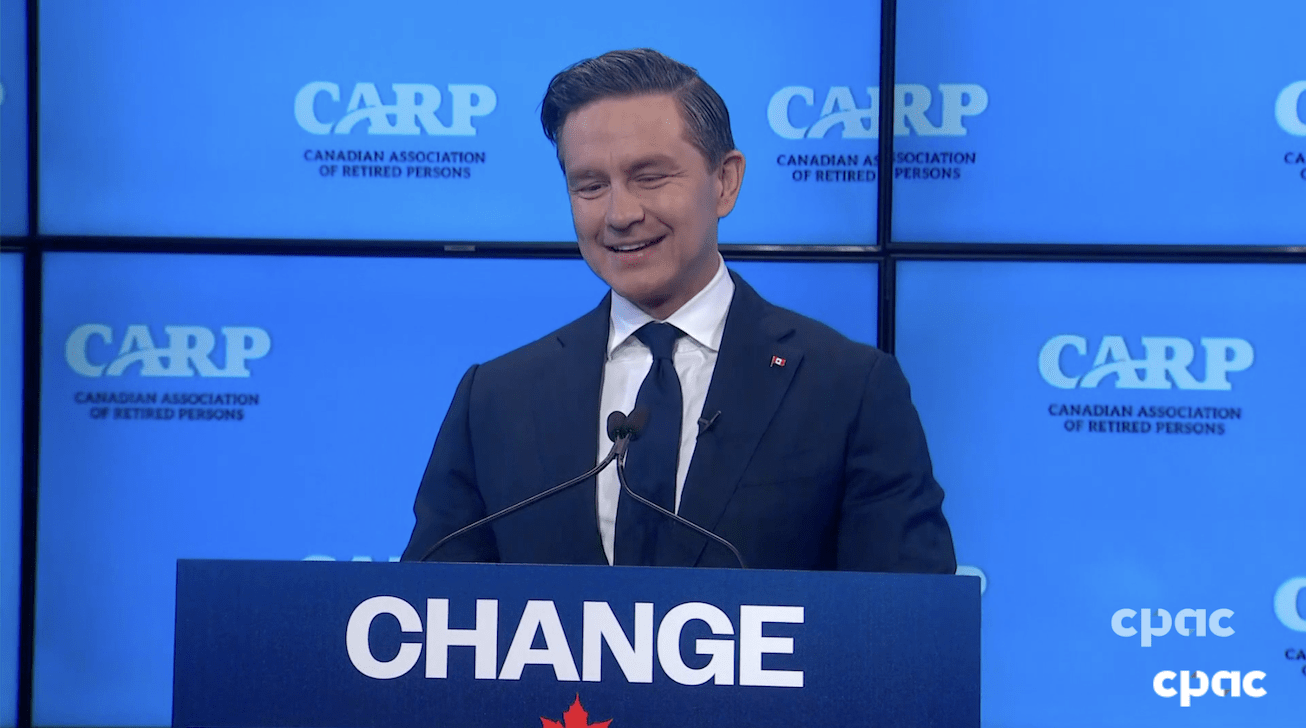The Homestretch: Mr. Poilievre Gets a Temperament Transplant
 A kinder, gentler, Carney-ish Pierre Poilievre?/CPAC screencap
A kinder, gentler, Carney-ish Pierre Poilievre?/CPAC screencap
By Lisa Van Dusen
April 21, 2025
Back in mid-February, more than a month before the federal election was called and just as Mark Carney was beginning to close the longstanding polling gap between Liberals and Conservatives, I filed a column on how elections are defined by two things: context and contrast. It’s a theme worth revisiting one week from Election Day.
In the case of this campaign, the context is the unprecedented existential threat from an American president and the contrast includes the difference in temperament between Carney and Conservative Leader Pierre Poilievre, as well as between Carney and Donald Trump.
In functioning, uncorrupted democracies, where propaganda isn’t used to fictionalize reality as a means to otherwise ludicrous ends, there’s not a lot a candidate can do to alter their public-persona DNA. To paraphrase Charles de Gaulle, the graveyards of politics are filled with candidates whose personality flaws served as insurmountable obstacles to power.
In some cases, those flaws were nowhere near as pronounced as oppo framing made them out to be (John Kerry, 2004); and in some, they were much, much worse (Richard Nixon, 1960, among others).
You can’t buy likeability, any more than you can fake authenticity, and some of the most entertaining stories in politics involve experiments in overnight personality transplants concocted to counter persistently hair-raising focus-group word-association results. The notorious Al Gore alpha-male makeover at the hands of Naomi Wolf as Henry Higgins comes to mind, complete with cowboy boots and earth tones marshalled to overcome the shredded coattails that were the real problem.
In recent weeks, just as Poilievre’s optics issue — the fact that his populist role model has suddenly become Canada’s public enemy number one just in time for a federal election and the opponent he helped drive out of office has been replaced by a hyperqualified change candidate — was becoming insurmountable, the Conservative leader has attempted a personality transplant to minimize the contrast between himself and his preternaturally calm opponent, and maximize the contrast between himself and the rampaging, autocratic lunacy of Donald Trump.
It’s as if, finding himself between the context rock of Donald Trump and the contrast hard place of Mark Carney, Poilievre has swapped all of his toxic, Trumpian traits for Carney’s reassuring reasonableness.
Or, as The Economist‘s Canada correspondent, Rob Russo, said on Peter Mansbridge’s Good Talk podcast after Poilievre’s debate performances last week, “Who kidnapped Pierre Poilievre? Because he’s not the same guy.”
Indeed, the Pierre Poilievre currently on offer to voters is not the one who made his reputation as a question-period terrier, then segued into that global club of right-wing performative populists whose embrace of screw-electability churlishness — especially when ratified by dubiously achieved election results — is flaunted as both a privilege of membership and a rationale for shock-and-awe, anti-democracy change.
The new Poilievre is calm, polite, and soothingly low-key. It’s as if, finding himself between the context rock of Donald Trump and the contrast hard place of Mark Carney, Poilievre has swapped all of his toxic, Trumpian traits for Carney’s reassuring reasonableness.
So, since early April, as Trump has been compelled to ixnay his relentless annexation threats and recalibrate his tariff terror to be less of a drag on the populist ticket next door, Poilievre has adopted a persona that seems to hinge on the hope that if he impersonates Mark Carney, nobody will know the difference.
For voters, it raises the obvious questions of a) whether a guy willing to pop into a phone booth and come out with a less of-putting personality can be trusted and, b) whether a guy who thinks they’re too daft to care can be trusted.
For Carney, it makes for the easiest stump-speech bit ever: “I know imitation is the sincerest form of flattery, but given a choice between real me and fake me, I know who I’d vote for.”
Policy Editor and Publisher Lisa Van Dusen has served as Washington bureau chief for Sun Media, international writer for Peter Jennings at ABC News, senior writer for Maclean’s and as an editor at AP National in New York and UPI in Washington.
